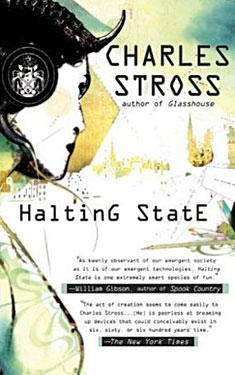Charles Stross
Completed 7/13/2015, Reviewed 7/15/2015
2 stars
Steve (You think you’re being so smart)
The first thing that hits you about “Halting State” is that
it is writing in second person present.
This means that you are the character.
And just like this review, you’re the narrator. You think this might be fun, a form you’ve
never experienced before, except in math problems where you have two apples and
someone gives you two more… But your
interest in the form fades as you discover that the narration alternates
between three character and what passes as prose leaves you confused and angry
through most of the book.
 Your gist of the plot is that it reminds you of standard
non-genre best seller intrigue. In the
near future, a virtual robbery takes place in a game owned and operated by
Hayek Associates. They call the
cops. Officer Sue is the first to
arrive, trying to wrap her head around the need for local police involvement in
a virtual crime. Hayek’s insurance
company sends Elaine, an auditor/game player and Jack, a power game
developer/player to determine if there is fraud to avoid paying the insurance
money. During these three characters’
investigations, they expose an international plot linked to espionage and
terrorism. You guess what makes this
book genre is that it takes place in the near future where there are video
cameras everywhere, cars and taxis are driverless, and google vision is
ubiquitous.
Your gist of the plot is that it reminds you of standard
non-genre best seller intrigue. In the
near future, a virtual robbery takes place in a game owned and operated by
Hayek Associates. They call the
cops. Officer Sue is the first to
arrive, trying to wrap her head around the need for local police involvement in
a virtual crime. Hayek’s insurance
company sends Elaine, an auditor/game player and Jack, a power game
developer/player to determine if there is fraud to avoid paying the insurance
money. During these three characters’
investigations, they expose an international plot linked to espionage and
terrorism. You guess what makes this
book genre is that it takes place in the near future where there are video
cameras everywhere, cars and taxis are driverless, and google vision is
ubiquitous.
Your problems begin in the first chapter. Officer Sue is the narrator. She thinks in future cop jargon. And she thinks a lot. What passes for prose in this book is that
the narrator begins speaking, pauses for a paragraph of jargon thought, then
finishes speaking. This makes most of
the text feel like an aside. It’s
supposed to help carry the mystery of who’s behind the bank robbery and what
the real implications are. Instead, it
makes every paragraph heavy and complicated.
In the second chapter, Elaine the auditor is the
narrator. Now you have to switch
perspective, trying to separate your experience as Elaine from Sue. She comes with a new set of jargon and
thought processes. Finally, Jack the
developer is the narrator. He thinks in
game and programming jargon. Juggling
these three points of view is exhausting.
Despite the chapter headings indicating who you are, it takes you a few
pages to completely switch your perspective, making you reread sections
multiple times to make sure you correctly understand who you are and what you just
read.
About halfway through the book, you’re over it. You force yourself to get to the big
reveal. The complexities of the plot and
are lost on you because of the form. It
reminds you of Chabon’s “Yiddish Policeman’s Union”, where the prose was
distracting rather than helpful in the world and character building. You also believe that not being a gamer is a
big hindrance in your understanding of what’s going on a lot of the time. In contrast, you love Cline’s “Ready Player
One”, which was about arcade games from the ‘80s, where your gaming experience
began and ended.
You really wanted to give this book one star out of five,
because your experience with it was so terrible. You think you’ll never read anything in
second person present again. But you
give it two, because you appreciate the author’s ability to carry the plot
through three very different perspectives, even though it was lost on you.
No comments:
Post a Comment